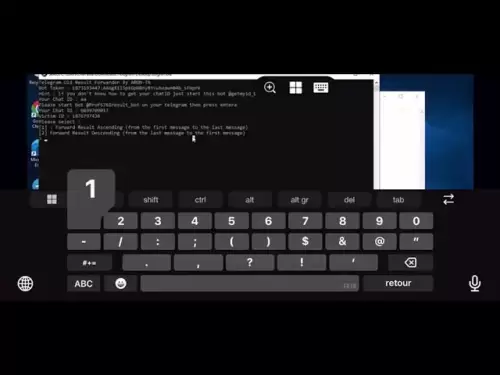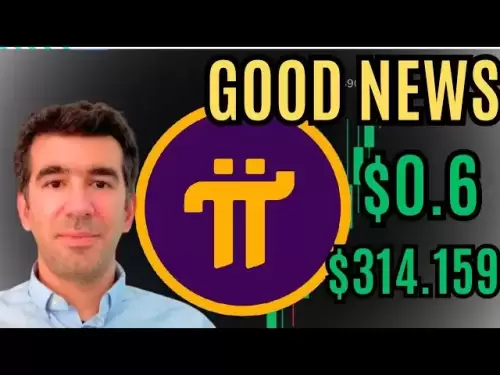-
 Bitcoin
Bitcoin $107,031.8162
-2.52% -
 Ethereum
Ethereum $2,621.4228
-2.51% -
 Tether USDt
Tether USDt $1.0001
-0.04% -
 XRP
XRP $2.2397
-4.12% -
 BNB
BNB $685.2354
-0.57% -
 Solana
Solana $169.7513
-4.44% -
 USDC
USDC $0.9998
0.01% -
 Dogecoin
Dogecoin $0.2178
-4.24% -
 TRON
TRON $0.2742
-0.79% -
 Cardano
Cardano $0.7353
-3.78% -
 Sui
Sui $3.5357
-4.72% -
 Hyperliquid
Hyperliquid $32.8671
-11.41% -
 Chainlink
Chainlink $15.3525
-3.68% -
 Avalanche
Avalanche $22.8728
-2.22% -
 Stellar
Stellar $0.2798
-3.35% -
 Toncoin
Toncoin $3.4068
13.49% -
 UNUS SED LEO
UNUS SED LEO $9.1041
2.33% -
 Shiba Inu
Shiba Inu $0.0...01398
-3.54% -
 Bitcoin Cash
Bitcoin Cash $405.5943
-3.07% -
 Hedera
Hedera $0.1818
-4.36% -
 Litecoin
Litecoin $93.6910
-3.21% -
 Polkadot
Polkadot $4.4305
-2.75% -
 Monero
Monero $349.3281
-8.45% -
 Bitget Token
Bitget Token $5.1994
-3.07% -
 Pepe
Pepe $0.0...01346
-3.80% -
 Dai
Dai $0.9998
0.01% -
 Pi
Pi $0.7211
-3.95% -
 Ethena USDe
Ethena USDe $1.0007
0.00% -
 Uniswap
Uniswap $6.6488
1.82% -
 Aave
Aave $261.6923
-5.14%
How does the DAO organization operate? Quickly understand decentralized autonomy
DAOs use blockchain and smart contracts to automate decisions without central authority, allowing members to vote on proposals and manage funds transparently.
May 26, 2025 at 10:56 am
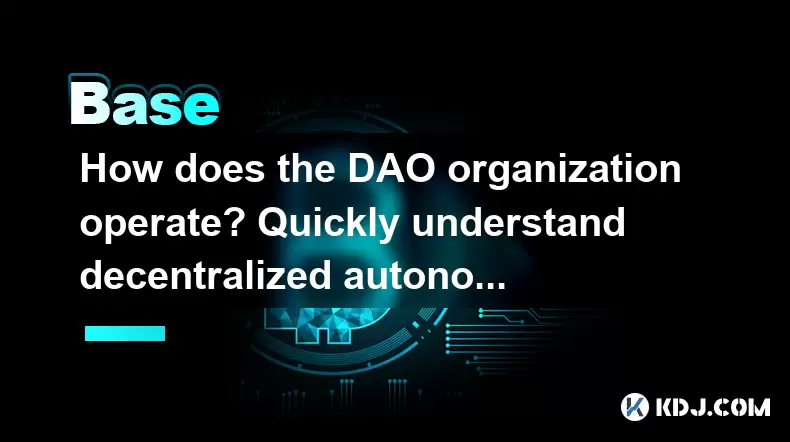
Decentralized Autonomous Organizations (DAOs) represent a revolutionary approach to organizational management and decision-making within the cryptocurrency and blockchain ecosystem. DAOs are essentially organizations that operate on blockchain technology, using smart contracts to automate and enforce rules and decisions without the need for centralized authority. This article will delve into the mechanics of DAO operations, helping readers quickly grasp the concept of decentralized autonomy.
What is a DAO?
A DAO, or Decentralized Autonomous Organization, is a collective of individuals governed by rules encoded as computer programs called smart contracts. These smart contracts run on a blockchain, which ensures transparency and immutability of the organization's operations. Unlike traditional organizations, DAOs do not have a central authority; instead, governance is distributed among its members, who can vote on proposals and decisions affecting the organization.
How DAOs are Formed
The formation of a DAO begins with the creation of a smart contract on a blockchain platform, such as Ethereum. This smart contract outlines the organization's rules, governance structure, and operational mechanisms. Once the smart contract is deployed, individuals can join the DAO by acquiring tokens, which represent their voting power and ownership within the organization. The initial setup of a DAO requires careful planning to ensure that the rules and mechanisms are robust and secure.
Governance and Decision-Making in DAOs
Governance in a DAO is a critical aspect that distinguishes it from traditional organizations. Members of a DAO participate in decision-making through a voting process. Proposals, which can range from changes in the organization's rules to financial decisions, are submitted to the DAO and voted on by token holders. The voting mechanism can vary, but typically, it is proportional to the number of tokens a member holds. This democratic approach ensures that decisions reflect the collective will of the members.
Operational Mechanisms of DAOs
DAOs operate through a series of automated processes facilitated by smart contracts. When a proposal is approved, the smart contract automatically executes the decision. This can include transferring funds, updating the organization's rules, or initiating new projects. The automation of these processes reduces the need for intermediaries and increases efficiency. Additionally, all transactions and decisions are recorded on the blockchain, providing a transparent and auditable trail of the DAO's activities.
Funding and Financial Management
Funding is a crucial aspect of DAO operations. DAOs often raise funds through token sales or initial coin offerings (ICOs). These funds are then managed through the DAO's smart contract, which can be programmed to allocate funds according to the organization's rules and approved proposals. Financial transparency is a key benefit of DAOs, as all financial transactions are recorded on the blockchain and accessible to members.
Challenges and Considerations
While DAOs offer numerous advantages, they also face several challenges. Security is a primary concern, as vulnerabilities in smart contracts can lead to significant financial losses. The infamous hack of The DAO in 2016, where millions of dollars in Ether were stolen, is a stark reminder of these risks. Additionally, the legal status of DAOs remains unclear in many jurisdictions, which can complicate their operations and interactions with traditional entities.
Practical Example: The DAO
To illustrate how a DAO operates, consider The DAO, one of the earliest and most notable examples. The DAO was created to function as a decentralized venture capital fund, allowing investors to vote on projects to fund. The process involved submitting project proposals, which were then voted on by token holders. If a proposal received sufficient votes, the funds were automatically disbursed to the project. This example highlights the potential of DAOs to democratize investment and decision-making.
Joining and Participating in a DAO
For those interested in joining a DAO, the process typically involves the following steps:
- Research the DAO: Understand its purpose, governance model, and the smart contract's rules.
- Acquire Tokens: Purchase or earn tokens that grant voting rights within the DAO.
- Participate in Governance: Engage in the voting process for proposals and decisions.
- Contribute to the Community: Participate in discussions and contribute ideas to the DAO's development.
Frequently Asked Questions
Q: Can anyone join a DAO?
A: Yes, generally anyone can join a DAO by acquiring its tokens. However, some DAOs may have specific requirements or restrictions for membership.
Q: How are disputes resolved within a DAO?
A: Dispute resolution in DAOs can vary. Some DAOs use arbitration through smart contracts, while others may rely on community consensus or external legal mechanisms, depending on their governance rules.
Q: What happens if a DAO's smart contract is hacked?
A: In the event of a hack, the DAO's response depends on its governance and legal framework. Some DAOs may have built-in mechanisms to halt operations and recover funds, while others might require community action or legal intervention.
Q: Are DAOs legal entities?
A: The legal status of DAOs is still evolving. In some jurisdictions, DAOs may be recognized as legal entities, while in others, they might not have a clear legal standing, complicating their operations and interactions with traditional legal systems.
Disclaimer:info@kdj.com
The information provided is not trading advice. kdj.com does not assume any responsibility for any investments made based on the information provided in this article. Cryptocurrencies are highly volatile and it is highly recommended that you invest with caution after thorough research!
If you believe that the content used on this website infringes your copyright, please contact us immediately (info@kdj.com) and we will delete it promptly.
- Bybit Lists USDC on Aptos, Launches Super Event With Over 20000 APT Up for Grabs
- 2025-05-29 03:35:15
- Troller Cat (TCAT) Presale Nears Stage 7 as Bitcoin Hits $111K
- 2025-05-29 03:35:15
- Crypto prices came under pressure on Tuesday morning as Bitcoin price retreated below $109000
- 2025-05-29 03:30:14
- Solana (SOL) Could Hit New All-Time Highs, Says Investment Advisory Firm
- 2025-05-29 03:30:14
- Mantix Aims to Challenge Hyperliquid's Crown as a Rising DeFi Star
- 2025-05-29 03:25:14
- The emergence of a new decentralised exchange, Mantix, currently in the presale stage, has continued to excite crypto investors and enthusiasts
- 2025-05-29 03:25:14
Related knowledge
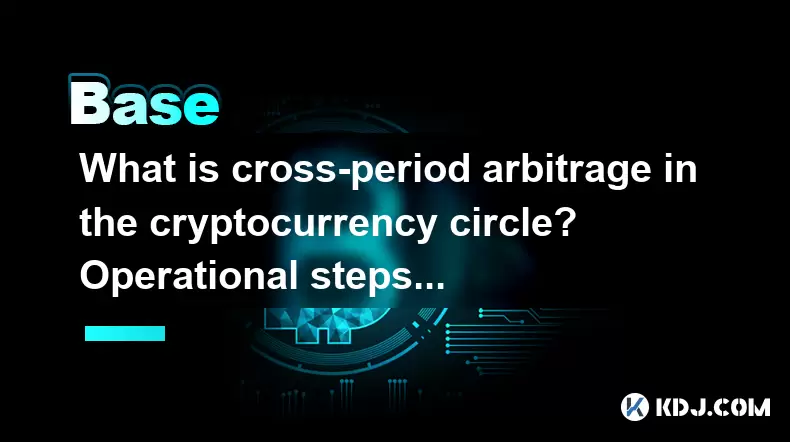
What is cross-period arbitrage in the cryptocurrency circle? Operational steps for cross-period arbitrage
May 29,2025 at 01:14am
What is Cross-Period Arbitrage in the Cryptocurrency Circle? Cross-period arbitrage in the cryptocurrency circle refers to the practice of exploiting price differences of the same asset across different time periods. This strategy involves buying an asset at a lower price in one period and selling it at a higher price in another period. The concept is r...
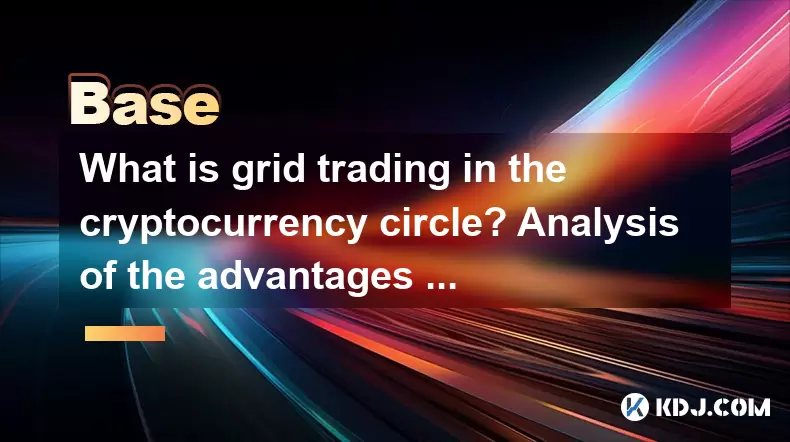
What is grid trading in the cryptocurrency circle? Analysis of the advantages and disadvantages of grid strategies
May 28,2025 at 03:07pm
Grid trading in the cryptocurrency circle refers to an automated trading strategy where a trader sets up a series of buy and sell orders at predetermined price levels. This creates a 'grid' of orders that automatically execute as the market price moves within the defined range. The primary goal of grid trading is to profit from the market's volatility b...
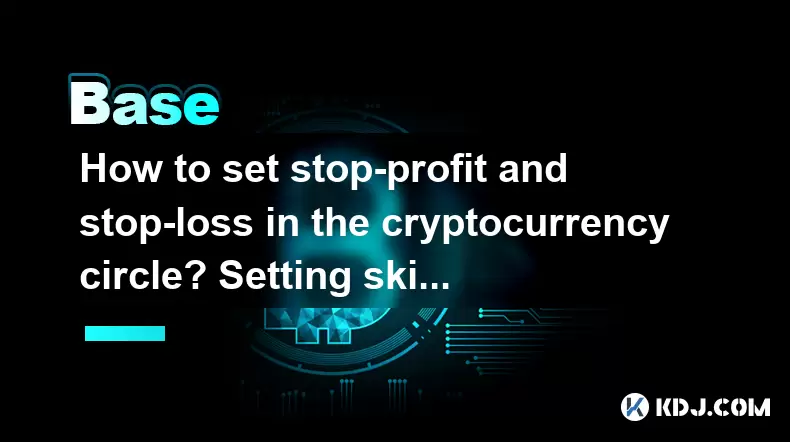
How to set stop-profit and stop-loss in the cryptocurrency circle? Setting skills and common misunderstandings
May 28,2025 at 11:28am
Setting stop-profit and stop-loss orders is a crucial strategy for managing risk and maximizing returns in the volatile world of cryptocurrencies. These tools help traders secure profits and limit losses by automatically executing trades when certain price levels are reached. However, understanding how to set these orders effectively and avoiding common...
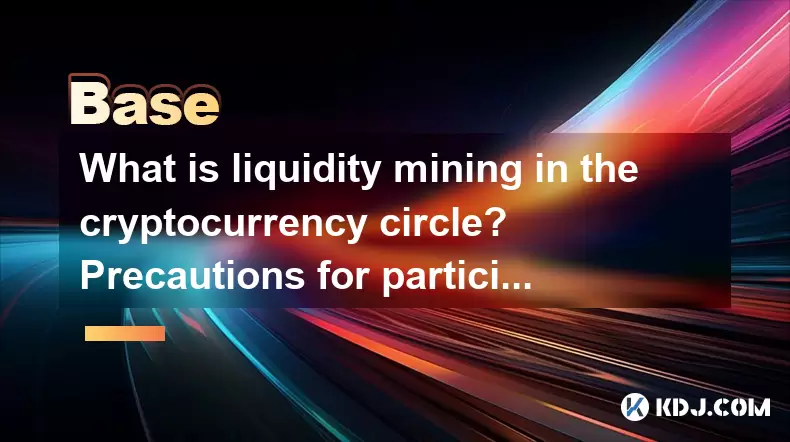
What is liquidity mining in the cryptocurrency circle? Precautions for participating in mining
May 29,2025 at 01:56am
Liquidity mining has become a buzzword within the cryptocurrency circle, attracting numerous enthusiasts and investors looking to leverage this opportunity. Liquidity mining refers to the process where users provide liquidity to a decentralized exchange (DEX) or a lending protocol and, in return, receive rewards, often in the form of the platform's nati...
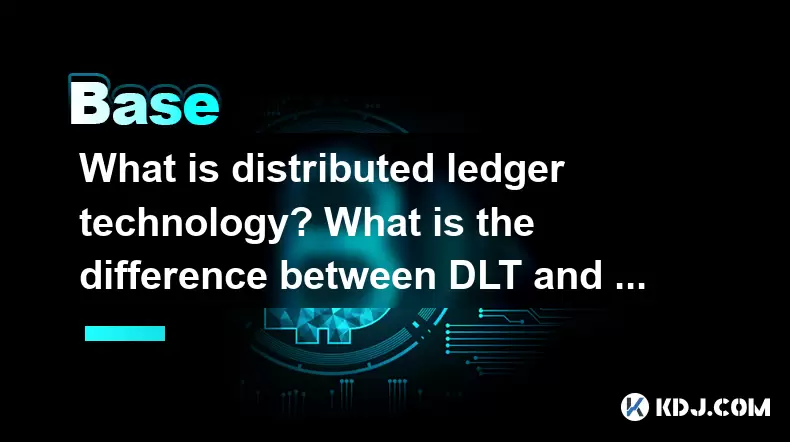
What is distributed ledger technology? What is the difference between DLT and blockchain?
May 29,2025 at 04:07am
Distributed Ledger Technology (DLT) is a decentralized database system that is managed by multiple participants across different locations and organizations. Unlike traditional databases, which are typically controlled by a single entity, DLT allows for a transparent and secure method of recording and sharing data across a network. This technology is fo...
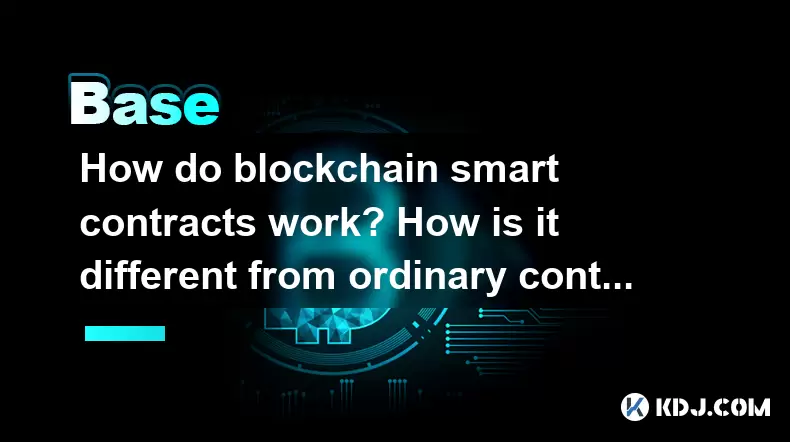
How do blockchain smart contracts work? How is it different from ordinary contracts?
May 28,2025 at 11:07am
Smart contracts are a pivotal component of blockchain technology, revolutionizing how agreements are executed in the digital age. At their core, smart contracts are self-executing contracts with the terms of the agreement directly written into code. They run on blockchain networks, ensuring transparency, security, and automation without the need for int...

What is cross-period arbitrage in the cryptocurrency circle? Operational steps for cross-period arbitrage
May 29,2025 at 01:14am
What is Cross-Period Arbitrage in the Cryptocurrency Circle? Cross-period arbitrage in the cryptocurrency circle refers to the practice of exploiting price differences of the same asset across different time periods. This strategy involves buying an asset at a lower price in one period and selling it at a higher price in another period. The concept is r...

What is grid trading in the cryptocurrency circle? Analysis of the advantages and disadvantages of grid strategies
May 28,2025 at 03:07pm
Grid trading in the cryptocurrency circle refers to an automated trading strategy where a trader sets up a series of buy and sell orders at predetermined price levels. This creates a 'grid' of orders that automatically execute as the market price moves within the defined range. The primary goal of grid trading is to profit from the market's volatility b...

How to set stop-profit and stop-loss in the cryptocurrency circle? Setting skills and common misunderstandings
May 28,2025 at 11:28am
Setting stop-profit and stop-loss orders is a crucial strategy for managing risk and maximizing returns in the volatile world of cryptocurrencies. These tools help traders secure profits and limit losses by automatically executing trades when certain price levels are reached. However, understanding how to set these orders effectively and avoiding common...

What is liquidity mining in the cryptocurrency circle? Precautions for participating in mining
May 29,2025 at 01:56am
Liquidity mining has become a buzzword within the cryptocurrency circle, attracting numerous enthusiasts and investors looking to leverage this opportunity. Liquidity mining refers to the process where users provide liquidity to a decentralized exchange (DEX) or a lending protocol and, in return, receive rewards, often in the form of the platform's nati...

What is distributed ledger technology? What is the difference between DLT and blockchain?
May 29,2025 at 04:07am
Distributed Ledger Technology (DLT) is a decentralized database system that is managed by multiple participants across different locations and organizations. Unlike traditional databases, which are typically controlled by a single entity, DLT allows for a transparent and secure method of recording and sharing data across a network. This technology is fo...

How do blockchain smart contracts work? How is it different from ordinary contracts?
May 28,2025 at 11:07am
Smart contracts are a pivotal component of blockchain technology, revolutionizing how agreements are executed in the digital age. At their core, smart contracts are self-executing contracts with the terms of the agreement directly written into code. They run on blockchain networks, ensuring transparency, security, and automation without the need for int...
See all articles





















